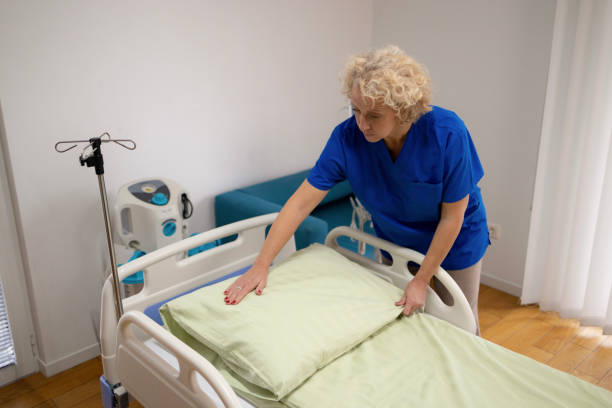Introduction

Living with Parkinson's disease can present numerous challenges, affecting a person's mobility and quality of sleep. Sleep disturbances and difficulty finding a comfortable position are common among individuals with Parkinson's. In the quest to improve their overall well-being and enhance their sleep experience, many Parkinson's patients have turned to adjustable beds as a potential solution.
These specialized beds offer a range of customizable features that can help alleviate the symptoms and discomfort associated with the disease. This blog post will discuss why adjustable beds may be beneficial for individuals with Parkinson's disease by explaining the advantages they offer in terms of sleep quality, comfort, and daily life.
What are Adjustable Beds?
Adjustable beds are beds that can be raised or lowered to different positions. The bed can be customized by adjusting its height and angle. This feature enables the user to comfortably sleep, sit, or lie down in various positions. This feature could be helpful for people with mobility issues such as arthritis or Parkinson's disease who struggle with bed access.
Some Reasons Why Adjustable Beds Can Be Ideal for Parkinson's Patients

Customized Sleep Positions:
Adjustable beds offer the advantage of customizing the sleep position to suit individual requirements. Parkinson's patients often experience discomfort and stiffness, which can be alleviated by finding the right sleep position. Adjustable beds allow them to elevate the head or foot of the bed, providing relief from muscle tension, reducing pain, and promoting better sleep.
Enhanced Circulation and Breathing:
Parkinson's disease can affect circulation and respiratory function, leading to difficulty breathing and poor blood flow. By adjusting the bed to an inclined position, Parkinson's patients can experience improved circulation and breathing. Elevating the upper body can help reduce the risk of nocturnal hypoxemia (low oxygen levels during sleep) and relieve respiratory distress, enabling a more restful sleep.
Minimized Nighttime Movement:
Parkinson's patients often experience involuntary movements during sleep, including limb twitching, restlessness, and frequent position changes. Adjustable beds can help minimize these nighttime movements by providing support and stability. Finding a comfortable position and reducing pressure points can help prevent sleep disruptions and enhance overall sleep quality.
Assistive Features:
Many adjustable beds offer additional features designed to enhance comfort and convenience. These features can be particularly beneficial for Parkinson's patients. For example, some beds have built-in massage functions that help alleviate muscle stiffness and promote relaxation. Others may have adjustable height options, making it easier for patients to safely get in and out of bed.
Caregiver Assistance:
Adjustable beds can also be helpful for caregivers who assist Parkinson's patients with their daily activities. By adjusting the bed to an elevated position, caregivers can provide better support during feeding, dressing, and personal hygiene tasks. This feature can reduce strain on the caregiver and the patient, enhancing the overall caregiving experience.
What is the Special Bed for Parkinson's Patients?
The special bed for Parkinson's patients is designed to help improve comfort, reduce the risk of injury, and promote better sleep for those suffering from the condition. The beds feature specialized foam mattresses that are specifically engineered to provide superior support and pressure relief while reducing muscle spasms and other discomforts associated with Parkinson's. In addition, the beds feature adjustable side rails that can be used to help keep patients safe and secure while sleeping or resting. These features make the beds much more comfortable than standard hospital beds, allowing individuals with Parkinson's to get the rest they need.
The special bed for Parkinson's patients also helps reduce the risk of injury by providing superior support and stability. The beds feature head of bed adjustability to various angles so patients can find the most comfortable position for their bodies. In addition, the beds are often equipped with safety straps to help keep patients securely in place during sleep or rest. Individuals with Parkinson's disease need to minimize the risks of falling and other accidents, as they often have serious repercussions.
Finally, the special bed for Parkinson's patients encourages better sleep. The beds are designed to provide a comfortable sleeping environment that supports good posture and helps reduce painful symptoms associated with Parkinson's. Getting better sleep can enhance the overall quality of life for individuals with the condition.
Are adjustable beds helpful for managing sleep disturbances associated with Parkinson's disease?

Yes, adjustable beds can be helpful for managing sleep disturbances associated with Parkinson's disease. Adjustable beds allow individuals to adjust the head and foot of the bed, providing support and comfort in multiple sleeping positions throughout the night. Adjustable beds benefit people with Parkinson's as they improve circulation, which helps reduce muscle tension and cramping that may cause sleep disturbances.
Additionally, adjustable beds can help maintain a healthy and comfortable sleeping position throughout the night, as Parkinson's disease tends to cause involuntary movements of the limbs during sleep. By adjusting the head and foot of an adjustable bed, individuals can reduce these involuntary movements and make it easier to stay asleep for longer periods.
Motorized controls in adjustable beds allow for the adjustment of the head and foot positions, resulting in easier access to get in and out of bed. People with Parkinson's disease who experience stiffness or difficulty walking can benefit from this helpful feature.
Do adjustable beds require special mattresses for Parkinson's patients?
Although adjustable beds may benefit some Parkinson's patients, special mattresses are not generally required. However, the mattress should provide good support and pressure relief to ensure comfort and reduce pain. If a mattress is excessively soft, it may cause a patient to sink in too deeply. This can result in poor posture or skin breakdown due to increased friction or shear. Mattresses with adjustable firmness levels are often beneficial for people with Parkinson's because they can be adapted to the patient's changing needs over time.
Memory foam and latex mattresses are commonly preferred by people who need additional support and those who like a more comfortable sleeping surface. However, it is important to consider if moving in bed is more difficult because the body sinks down into the foam thereby increasing frictional resistance to repositioning efforts. Top-of-the-line air mattresses allow users to adjust the firmness of the mattress with just a few clicks, making them ideal for those with Parkinson's who may have difficulty changing their sleeping positions.
When choosing a mattress for a Parkinson's patient, comfort should always be a top priority. When choosing a mattress, it's important to consider the patient's weight, size, and any medical conditions they might have. It is recommended that the patient visit a mattress store to test multiple mattresses and choose the one that suits them best. Ultimately, it is up to each individual Parkinson's patient to determine what type of mattress will provide optimal comfort and support.
Can adjustable beds improve the overall quality of life for Parkinson's patients?
Yes – adjustable beds can improve the overall quality of life for Parkinson's patients in several ways. Adjustable beds benefit individuals with Parkinson's disease as they can easily and comfortably adjust their sleeping position, which may help relieve symptoms like stiffness, tremors, and difficulty with movement. An adjustable bed also makes getting in and out of easier, reducing the risk of falls. Additionally, an adjustable bed supports improved circulation and can be set to reduce pressure on sore muscles and joints.
Adjustable beds benefit Parkinson's patients by offering improved comfort and convenience, ultimately enhancing their quality of life. By modifying the head and foot elevation, users can find comfortable positions that alleviate pain and stiffness, promoting better sleep. Adjustable beds can improve the ability of people with Parkinson's to get in and out of bed and move around at night by providing more secure access. Adjustable beds also provide therapeutic benefits such as improved blood flow, reduced pressure on sore muscles and joints, and better air circulation. The various advantages can significantly impact the quality of life for individuals with Parkinson's disease.
Adjustable beds can be helpful for individuals with Parkinson's who want to enhance their quality of life. While an adjustable bed is not be a cure, it can help make daily life much more comfortable and enjoyable. Parkinson's patients can improve their quality of life by using suitable medications, changing their lifestyles, and using helpful equipment like friction-reducing sheets and sleepwear, and adjustable beds.
If you or someone you know is affected by Parkinson's disease, consider discussing with a doctor whether an adjustable bed could be beneficial. With the right support, Parkinson's patients can still live a full and enjoyable life.
FAQ's
What is the best equipment for Parkinson's patients?
The best equipment for Parkinson's patients depends on the individual and their needs. Assistive devices such as mobility-enhancing friction-reducing sheets and sleepwear, adjustable beds, walkers, canes, wheelchairs, shower chairs, and mobility scooters can all help improve quality of life. Speaking to a healthcare provider about which type of equipment would be most beneficial is important.
What helps Parkinson's patients sleep?
Adjustable beds are a great option for Parkinson's patients, as they allow users to adjust the elevation of the head and foot. Using this method can lessen discomfort and rigidity while enhancing your sleep quality. Friction-reducing sheets and sleepwear allow easier moving and less disruption. This can lead to better and more continuous periods of sleep. Additionally, medications that help with muscle relaxation or improved sleep quality may be recommended by your healthcare provider, depending on your needs.
Why do Parkinson's patients have trouble turning over in bed?
Parkinson's disease can cause difficulty with movement, stiffness, and tremors. This makes it difficult for patients to turn over in bed, as they may have trouble changing positions or lack the strength necessary for movement. An adjustable bed, especially when paired with friction-reducing sheets and sleepwear can improve sleep quality by allowing easier movement during the night with less exertion, struggle and frustration.
How do people sleep with Parkinson's?
People with Parkinson's can sleep in any position that is comfortable for them. However, adjustable beds are a great option as they allow users to adjust the head and foot elevation and mattress firmness, with some options, to find the most comfortable positions. This can help alleviate pain and stiffness while enhancing your sleep quality.
Do people with Parkinson's need a lot of sleep?
People with Parkinson's may need more sleep than the average person due to the physical and mental strain of the disease. Parkinson's patients need good quality sleep to help manage symptoms and allow their body time to rest and recover. Adjustable beds can be beneficial as they provide comfort and support while making moving around during the night easier.
What happens at the end of Parkinson's?
The course of Parkinson's is different for everyone. In the later stages, it can cause difficulty with movement and coordination and problems with speaking and swallowing. Parkinson's patients may also experience depression, anxiety, and fatigue. Speaking to your doctor about managing symptoms to improve your quality of life is important.
Conclusion
I hope this article has helped you understand why adjustable beds are a good option for individuals with Parkinson's.To begin addressing Parkinson's disease, consider discussing the potential benefits of an adjustable bed with a doctor for yourself or someone you know. With the right support and assistive devices, Parkinson's patients can still live full and enjoyable life.

